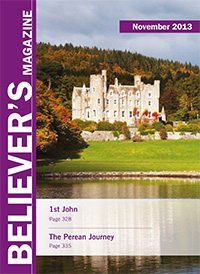Found Faithful by William Gilmore; published and available from John Ritchie Ltd; 120 pages. Price £7.99. (9781907731945)
The name William Gilmore may not be familiar to many younger readers of the Believer's Magazine. A worthy servant of the Lord, he was called home in 1958. This 120-page paperback was compiled by Jim Hutchison and is now re-published by John Ritchie Ltd as part of the Classic Reprint Series.
The Publisher's note indicates that the seven chapters are in the main, if not wholly, addresses delivered by William Gilmore. They are a delight to read. The much-revered William Hoste notes in the Foreword that this book needs no commendation from him. However, 55 years after his service, most readers would need some commendation of the contents of Found Faithful, which the reviewer is pleased to provide.
The selection of topics the compiler has drawn from the author's studies is well-balanced and will be helpful to readers of all ages. The reader encounters a number of Bible characters: Paul (as he describes himself and his own experience of the grace of God in Philippians 3), some of David's mighty men, as well as Daniel, Gideon and Elijah. In the chapter on 2 Timothy, we briefly meet Timothy but also a number of pairs of men that Paul could not commend – Phygellus and Hermogenes, Hymenaeus and Philetus, Jannes and Jambres – against whom Timothy was warned. In that same chapter Paul speaks of "an Almighty Saviour" and the Holy Spirit who bequeathed to us the "God-breathed" Scriptures. The teaching presented in seven chapters is relevant to our time and Christ-exalting.
Clearly, William Gilmore's ability to engage with his audiences was notable in his day, and Found Faithful now provides engagement with a second cohort of readers. His language will present no obstacles, and his unique ability to find memorable headings will focus attention on key elements of the message he believed God had given him to deliver. This is particularly marked in "The Model Christian", Paul's autobiographical outline of living for Christ, and in "Devotedness to Christ" (based on 2 Samuel 15 and 23).
-TW
Tell me more about The Church by Bert Cargill; published and available from John Ritchie Ltd; 108 pages. Price £5.99. (9781907731570)
Tell me more about The Church is an addition to the "Tell me more…" series. The flyleaf and the Preface both acknowledge that it is based on New Testament Church Principles by Arthur G Clarke, published in the first half of the 20th century. The Publishers' intention is that this present volume should be easier to read "especially by those whose first language is not English". That worthy objective has been achieved.
There are other changes which distinguish Tell me more about The Church from the reviewer's recall of New Testament Church Principles. Each section concludes with matters for further study and "Points to Remember". A helpful Index is also provided.
The 108-page book comprises twelve chapters addressing a number of important topics: What is the Church? Church Discipline, Church Finance, the Destiny of the Church as well as practices such as baptism, the Breaking of Bread, the role of elders and ministry.
The author also deals with matters demanding care and sensitivity. He deals with the reception of those seeking fellowship with an assembly on a permanent basis and the need for any valid objection to be considered. The areas he lists as issues to be considered are: "evidence of salvation, soundness of doctrine and consistency of life." He also stresses the importance of letters of commendation when a Christian is visiting another assembly, and provides guidance where it has not been possible for the visitor to produce a letter of commendation. The guidance offered places a great measure of responsibility upon the elders of the assembly, whose is the task of interviewing visitors briefly and graciously, and without adhering to any "local rule" – a caution added without explanation. Elders would need to be assured that the same standards of "soundness of doctrine and consistency of life" mark the visitor as is expected in one applying for fellowship in the assembly, more particularly if the elders are not familiar with the local assembly where the visitor normally meets.
An area of contention in some churches relates to the service of women. This service the author places in a creatorial context and within that broad setting, in a marriage framework. He also stresses the distinctions between the sexes in respect of dress and hair styles. Whilst owning that as far as "redemption … and … salvation" are concerned there is no distinction in the standing of male or female (Gal 3.28), he states firmly that testimony of the New Testament is that there are distinctions in the public gatherings of an assembly. Also noted are the reasons given for those distinctions. Particularly helpful is the consideration of six misunderstood texts related to the service of women. New Testament Church Principles also provides guidance as to the work that godly women can undertake.
-TW









